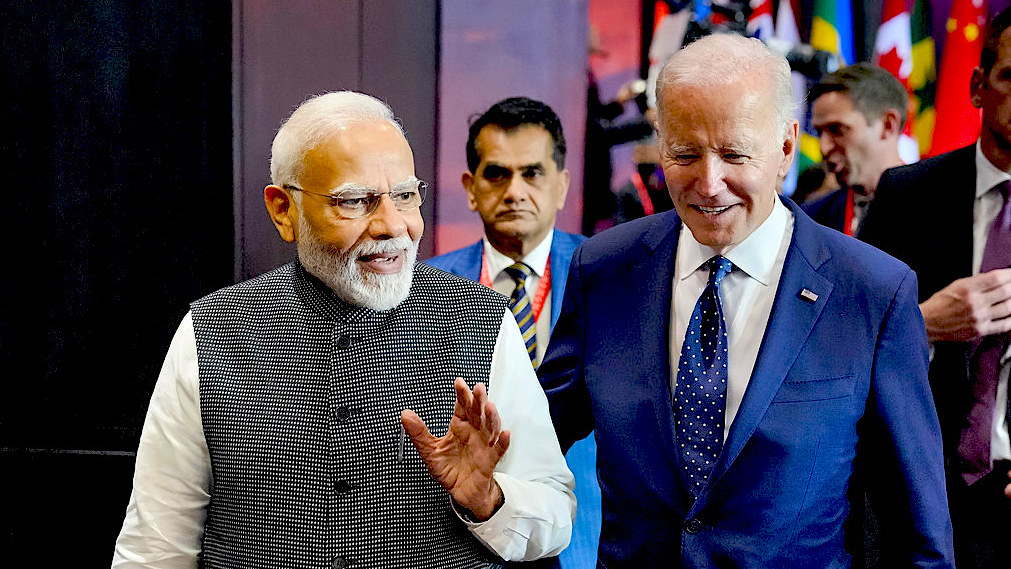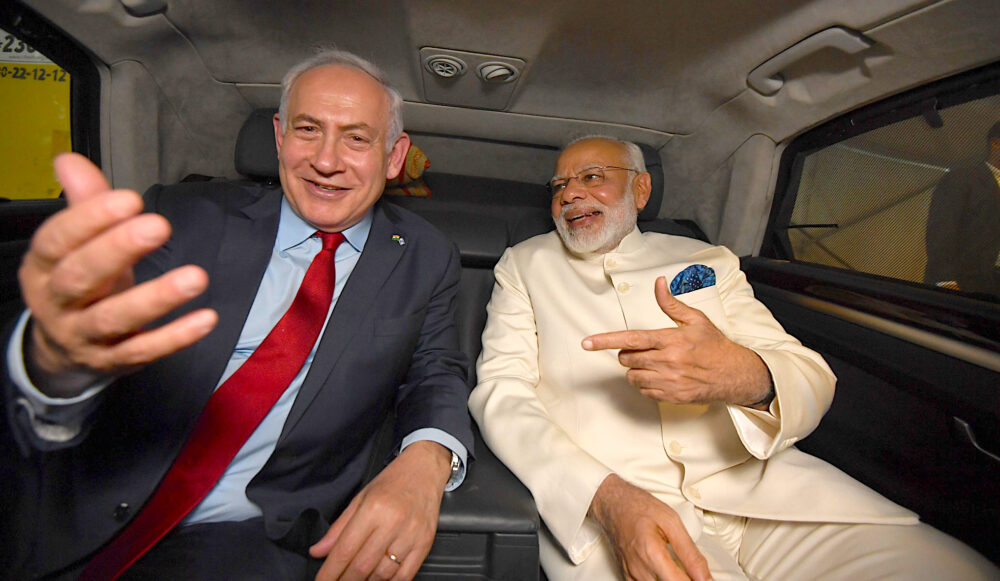The pro-Israel affinity of propagandists aligned with majoritarian Hindutva political forces in India is rooted in Islamophobia, writes Ullekh N.P., and the MSM remains silent about it.
By Ullekh N.P.
in New Delhi
Special to Consortium News
 Did Hamas raise funds on Israel’s stock exchange by shorting ahead of the Oct. 7 attack? The report by U.S. law professors Robert Jackson Jr and Joshua Mitts that analyzed Israeli stock sales doesn’t say so. The 66-page study merely said that the “short-selling of Israeli securities on the Tel Aviv Stock Exchange (TASE) increased dramatically” ahead of Oct. 7.
Did Hamas raise funds on Israel’s stock exchange by shorting ahead of the Oct. 7 attack? The report by U.S. law professors Robert Jackson Jr and Joshua Mitts that analyzed Israeli stock sales doesn’t say so. The 66-page study merely said that the “short-selling of Israeli securities on the Tel Aviv Stock Exchange (TASE) increased dramatically” ahead of Oct. 7.
However, a large section of the Indian media had no doubts whatsoever about the perpetrators. A video on the Times of India website blamed Hamas for shorting and striking gold. News anchor Ketki Angre ran a video under the headline “Hamas possibly profited from Israeli stock market bets prior to October terror attacks”. The opening text accompanying Angre’s video says:
“According to a report by prominent US researchers, individuals linked to Hamas may have gained substantial financial benefits from the terrorist attacks on October 7.”
But a full reading of the report, titled “Trading on Terror?” confirms that the authors have not pointed fingers directly at Hamas. It just says this:
“While many investigating how the Hamas attack was financed have focused on cryptocurrency, to our knowledge little attention has been given to trading in securities markets in advance of Oct. 7 — an important omission given the relative sizes of the cryptocurrency and securities markets.”
The report adds: “Taken together, our evidence is consistent with informed traders anticipating and profiting from the Hamas attack.”
The study by these American professors found that for Leumi, Israel’s largest bank, 4.43 million shares sold short over the period September 14 to October 5 yielded profits of 3.2 billion shekels (U.S.$859 million).
Interestingly, shortly after the news broke on Dec. 4-5, the Tel Aviv Stock Exchange said the “Trading on Terror?” report was inaccurate and its publication irresponsible.
Media Reflects Positions of Government
Not long after the Times of India aired its biased report, NDTV, the Indian media organization in which Prime Minister Narendra Modi’s friend and billionaire businessman Gautam Adani owns a majority stake, sprang into action stating that the “study claims Hamas made millions by short selling ahead of Oct 7 attack”. Mint newspaper also ran a header along those lines:
“Hamas likely profited from Israel stock markets over short selling ahead of October terror attacks: US-based study”.
Contrast it with the Western mainstream media, which, despite its inherent pro-Israel bias, stuck to the report’s actual finding.
“Traders earned millions anticipating Oct. 7 Hamas attack, study says”, The Washington Post headline stated, without blaming Hamas directly. The Wall Street Journal headline read: Short-Selling in Israeli Stocks Jumped Before Hamas Attacks, Paper Finds. Here’s how a headline by CBS News read: “Study: Someone bet against the Israeli stock market in the days before Hamas’ Oct. 7 attack.”
So, who hedged their bets and profited? It could have been anyone in the know, the report says. The U.S. intelligence community had repeatedly warned the Biden administration about Hamas preparing to launch a rocket attack against Israel.
An Egyptian official was quoted in the media as saying that Cairo had warned Israel about an impending major strike against them. Tel Aviv, which is under fire for the massive failure of its famed intelligence apparatus, however, denied it had received any such heads-up.
Even if you are to call out Indian mainstream journalism for sloppy homework, such reporting is proof of insensitivity towards the Palestinian side of the story.
In a country where the majority of the political bureaus of mainstream news outlets are taught to be servile to the government in power to protect the business interests of their owners – and from raids from federal agencies – the media’s position against Palestine reflects the mindset of those in power.
As early as July 2014, within months of Modi coming to power as prime minister for the first time, the then external affairs minister Sushma Swaraj had stalled a discussion on the Israel-Palestine row in the upper House of Parliament (Rajya Sabha) stating that “no discourteous reference should be made to a friendly nation.”
An Indian Tightrope

India’s Prime Minister Narendra Modi with U.S. President Joe Biden at the G20 on Nov. 15, 2022, in Bali, Indonesia. (White House/Adam Schultz)
Years later, on Dec. 27, 2023, Rajya Sabha, a member Saket Gokhale, took to X to protest the Modi government’s refusal to answer questions on Israel from even lawmakers in India. The government recanted the same 2014 logic while disallowing questions by Members of Parliament that the government of the day is meant to answer and place before the House.
He asked how many Israeli nationals were currently resident in India on long-term visas? How many criminal cases and types of offenses had been registered against Israeli nationals by police and agencies across India, year-wise, between Jan. 2015 till date?
He also asked how many Israeli nationals had been deported or ordered to leave India for overstaying their visas, year-wise between Jan. 2015 till date?
The explanation given for disallowing Gokhale’s questions by the Modi government was it “refers discourteously to a friendly country.”
True, the Indian government is walking the tightrope on the Israel-Palestine issue. After all, it doesn’t want to displease the Arab world which, put together, is the highest source of remittances to India by its diaspora.
At the same time, New Delhi wants to keep close ties with Israel, with which it normalized relations in the early 1990s, because of growing military ties. India had allegedly bought the Pegasus software from Israel to spy on dissenters, journalists, and even Opposition ministers, a charge denied by the Modi government.
New York-based South African journalist Azad Essa – whose 2022 book Hostile Homelands focuses on the two countries’ growing military-industrial relationship from the 1990s and the ideological link between Zionism and Hindutva – recently spoke about Israel’s export of military hardware marketed as “battlefield-tested technology” to India.
Meanwhile, numerous reports have surfaced even in the Western media that Hindu nationalists – those who follow the political ideology of Hindutva as separate from Hinduism as a religion, much like the difference between Zionism and Judaism – are a major source of fake news peddling and the creation of hate-spewing videos targeted at Palestinians.
This comes at a time when a population of 2.3 million Palestinians is being subject to genocide by a settler-colonial-occupier state.
Hindutva Propaganda and Zionism

Palestinians inspect the damage following an Israeli airstrike on the El-Remal aera in Gaza City on October 9, 2023. (Naaman Omar apaimages/Wikimedia Commons)
The death toll in Gaza from Israeli attacks since Oct. 7, in gross violation of international laws, has crossed 21,000, approximately half of whom are children and women, and many tens of thousands have been injured. Almost the entire population has been displaced from their homes, and half of the city has been wiped out including infrastructure like hospitals, schools and universities.
The pro-Israel affinity of propagandists who align with the majoritarian Hindutva political forces in India is rooted in Islamophobia. Muslims account for less than 15 percent of India’s population, while Hindus make up close to 80 percent.
The politics of polarization by Hindutva forces have won rich dividends at the hustings, pulling in the votes of Hindus who are otherwise divided along caste lines.
The projection of Muslims as the age-old enemy is at the core of Modi’s political propaganda. Various government reports have suggested that the majority of Muslims live miserable lives and are disadvantaged financially and politically.
Yet they are routinely demonized by the dominant political party in the country to pull in votes from across the Hindu spectrum.
As a result, the Hindu-first agenda and intolerance of opposing views, including those in Parliament, are corroding democracy in the country.
The effects of toxic majoritarianism are felt across society, especially in the media, even as the government mixes politics with religion. The media fails to rise to the occasion to call out the government for its excesses, including the rampant use of religious symbols at government events though India is a secular nation.
On the other hand, the media offers wide coverage of Hindu religious functions that Modi attends.
Modi was one of the first among world leaders to express support for Israel on Oct. 7. He said on X:
“Deeply shocked by the news of terrorist attacks in Israel. Our thoughts and prayers are with the innocent victims and their families. We stand in solidarity with Israel at this difficult hour.”
That set the agenda for a large section of mainstream media which, like American social-media platforms, continue to downplay Palestinian suffering. As with right-wing Hindutva trolls, the trauma of the Gazans has been a moment of joy and exhilaration amidst soaring Islamophobic rants across Indian society.
It is ironic that the founders of India’s Hindutva movement had glorified and deified Hitler, and lapped up Nazism as a model for building a Hindu Rashtra (nation) in India.
The truth about the Indian news ecosystem, which now comprises American social-media platforms and a mainstream media that chases social media to keep pace, is as tragic as it is farcical. In the face of authoritarian tendencies, legacy media has lost its sting to challenge the Islamophobia of the ruling party.
Ullekh N.P. is a writer, journalist, and political commentator based in New Delhi. He is the executive editor of the newsweekly Open and author of three nonfiction books: War Room: The People, Tactics and Technology Behind Narendra Modi’s 2014 Win; The Untold Vajpayee: Politician and Paradox; and Kannur: Inside India’s Bloodiest Revenge Politics. His forthcoming book on Cuba, part travelogue and part political commentary, is due for release in mid-2024.
The views expressed are solely those of the author and may or may not reflect those of Consortium News.
Please DONATE to CN’S Winter Fund Drive




It’s not surprising. He was recorded outside a Davos meeting saying that he too wishes there are fewer people in the world. That video has of course disappeared. Scary for those who live in India. Which people he might target for elimination?
Some weeks ago, professor Radhika Desai, in a podcast video with prof. Michael Hudson called Modi “a fucking fascist” then quickly apologized for her rough language.
No apology necessary, this article underlines your statement and the that language completely appropriate.
This may serve us as a reminder of principle.
We really are in a world in which the principal engine of oppression and despair is a ruling class that roughly corresponds to the US and NATO and, in that, with 500 years or so of mercantile and capitalist empire. Because this is so, the rise of BRICS really does constitute a loosening of oppression. But that does not mean that BRICS itself or the ruling classes of these individual nations are unproblematic.
Islamophobia is a problem at least as deeply rooted in India as it is in the West, and more than it is in much of the West. It is not particularly a better Islamophobia aside from having been, historically, less well armed.
This is not the first time that Indian ruling classes have embraced complicity.
Black flag events are obvious opportunities for savvy insiders to cash in on the predictable market downturn. It happened on 9/11….is it any surprise that it reoccured on 10/7? Whenever there are reports of “some insiders” selling short a stock the complete story of who had the inside information cannot be truly understood until the actual names of the profiteers are disclosed. But for some mysterious reason these humans are never identified.
In fact, this pattern is circumstantial evidence that a black flag event has indeed taken place…and that a reputable regulatory investigation has not occurred….which implies a governmental cover-up. All that ever happens, as this story relates, is that the pro government media starts dropping innuendos about some crafty evildoers intent on destroying our cultural dream.
I regret to hear that this pattern is playing out in India…but I am not surprised. We are facing a force that intends to rule the world.
India’s conscience isn’t exactly ‘clean’ either…Birds of a feather…
So India basically is the eastern U.S., pro-Zionist capitalist oligarchy running things, even closer to theocracy than we are because of the near-fanatic religious majority, but on the surface a secular democracy, an archaic caste system and extreme economic inequality, plus grudges and prejudices that go back generations. We may have a very different history but today we seem to be in the same spot. The only difference is that the Indian military isn’t running amok all over the world. I wonder how the average Indian citizen feels about Modi.